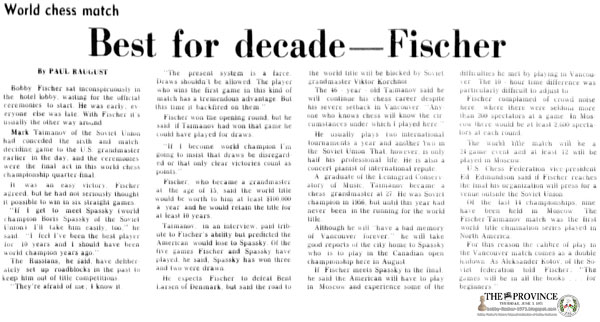The Province Vancouver, British Columbia, Canada Thursday, June 03, 1971 - Page 47
World Chess Match: Best for Decade -- Fischer by Paul Raugust
Bobby Fischer sat inconspicuously in the hotel lobby, waiting for the official ceremonies to start. He was early; everyone else was late. With Fischer it's usually the other way around.
Mark Taimanov of the Soviet Union had conceded the sixth and match deciding game to the U.S. grandmaster earlier in the day, and the ceremonies were the final act in this world chess championship quarter-final.
It was an easy victory, Fischer agreed, but he had not seriously thought it possible to win in six straight games.
“If I get to meet Spassky (world champion Boris Spassky of the Soviet Union) I'll take him easily, too,” he said. “I feel I've been the best player for 10 years and I should have been world champion years ago.”
The Russians, he said have deliberately set up roadblocks in the past to keep him out of title competitions.
“They afraid of me; I know it.
“The present system is a farce. Draws shouldn't be allowed. The player who wins the first game in this kind of match has a tremendous advantage. But this time it backfired on them.”
Fischer won the opening round, but he said if Taimanov had won that game he could have played for draws.
“If I become world champion I'm going to insist that draws be disregarded or that only clear victories count as points.”
Fischer, who became a grandmaster at the age of 15, said the world title would be worth to him at least $100,000 a year and he would retain the title for at least 10 years.
Taimanov, in an interview, paid tribute to Fischer's ability but predicted the American would lose to Spassky. Of the five games Fischer and Spassky have played, he said, Spassky has won three and two were drawn.
He expects Fischer to defeat Bent Larsen of Denmark, but said the road to the world title will be blocked by Soviet grandmaster Viktor Korchnoi.
The 46-year-old Taimanov said he will continue his chess career despite his severe setback in Vancouver. “Anyone who knows chess will know the circumstances under which I played here.”
He usually plays two international tournaments a year and another two in the Soviet Union. That, however, is only half his professional life. He is also a concert pianist of international repute.
A graduate of the Leningrad Conservatory of Music, Taimanov became a chess grandmaster at 27. He was Soviet champion in 1956, but until this year had never been in the running for the world title.
Although he will “have a bad memory of Vancouver forever,” he will take good reports of the city home to Spassky who is to play in the Canadian open championship here in August.
If Fischer meets Spassky in the final, he said the American will have to play in Moscow and experience some of the difficulties he met by playing in Vancouver. The 10-hour time difference was particularly difficult to adjust to.
Fischer complained of crowd noise here, where there were seldom more than 200 spectators at a game. In Moscow there would be at least 2,000 spectators at each round.
The world title match will be a 24-game event and at least 12 will be played in Moscow.
U.S. Chess Federation vice-president Ed Edmondson said if Fischer reaches the final his organization will press for a venue outside the Soviet Union.
Of the last 14 championships, nine have been held in Moscow. The Fischer-Taimanov match was the first world title elimination series played in North America.
For this reason the caliber of play in the Vancouver match comes as a double letdown. As Aleksander Kotov of the Soviet federation told Fischer: “The games will be in all the books … for beginners.”























